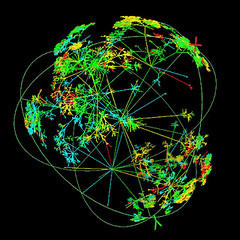learning maths
Steve Yegge offers some advice about learning maths. He takes a programmers perspective but his article ranges beyond that perhaps. I might accept his advice and learn some more maths. Here are some extracts that I found particularly useful. The place to start would be his paragraph about using wikipedia. That is a really interesting idea and tremendous praise for wikipedia. I've taken the trouble to put in some links to wikipedia in my extract below.
The Math They Didn't Teach You
... most of the math you learn in grade school and high school is continuous: that is, math on the real numbers. For computer scientists, 95% or more of the interesting math is discrete: i.e., math on the integers...
For programmers, the most useful branch of discrete math is probability theory... How many ways are there to make a Full House in poker? Or a Royal Flush? Whenever you think of a question that starts with "how many ways..." or "what are the odds...", it's a probability question.
Other important maths topics for programmers ... Statistics, Algebra and Linear Algebra (i.e., matrices), Mathematical Logic
Information Theory and Kolmogorov Complexity ... Information theory is (veeery roughly) about data compression, and Kolmogorov Complexity is (also roughly) about algorithmic complexity. I.e., how small you can you make it, how long will it take, how elegant can the program or data structure be, things like that.
The Right Way To Learn Math
The right way to learn math is breadth-first, not depth-first ...
The right way to learn math is to ignore the actual algorithms and proofs, for the most part, and to start by learning a little bit about all the techniques: their names, what they're useful for, approximately how they're computed, how long they've been around, (sometimes) who invented them, what their limitations are, and what they're related to. Think of it as a Liberal Arts degree in mathematics.
Why? Because the first step to applying mathematics is problem identification ...
I think the best way to start learning math is to spend 15 to 30 minutes a day surfing in Wikipedia. It's filled with articles about thousands of little branches of mathematics. You start with pretty much any article that seems interesting (e.g. String theory, say, or the Fourier transform, or Tensors, anything that strikes your fancy. Start reading. If there's something you don't understand, click the link and read about it. Do this recursively until you get bored or tired.
Doing this will give you amazing perspective on mathematics, after a few months. You'll start seeing patterns — for instance, it seems that just about every branch of mathematics that involves a single variable has a more complicated multivariate version, and the multivariate version is almost always represented by matrices of linear equations. At least for applied math. So Linear Algebra will gradually bump its way up your list, until you feel compelled to learn how it actually works, and you'll download a PDF or buy a book, and you'll figure out enough to make you happy for a while.
With the Wikipedia approach, you'll also quickly find your way to the Foundations of Mathematics, the Rome to which all math roads lead. Math is almost always about formalizing our "common sense" about some domain, so that we can deduce and/or prove new things about that domain. Metamathematics is the fascinating study of what the limits are on math itself: the intrinsic capabilities of our formal models, proofs, axiomatic systems, and representations of rules, information, and computation.





0 Comments:
Post a Comment
<< Home